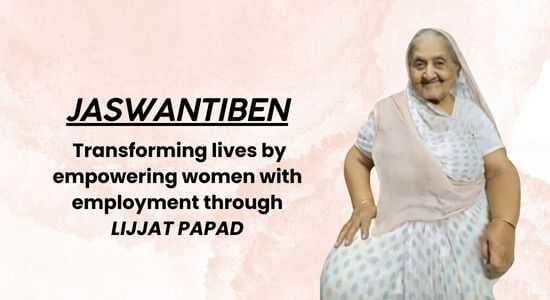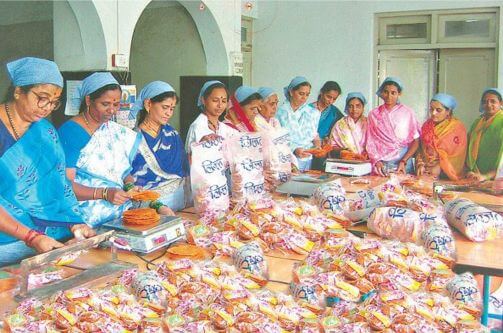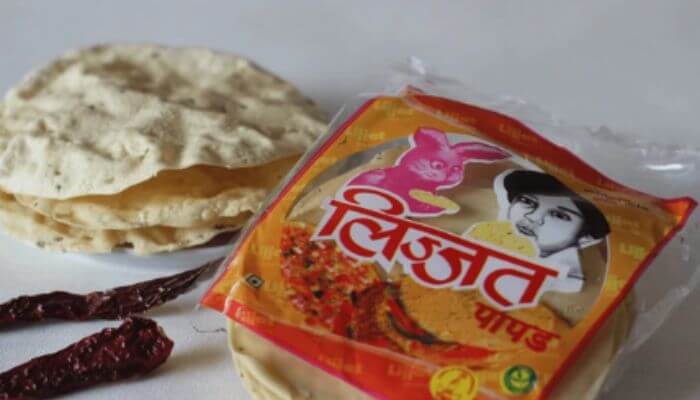Shri Mahila Griha Udyog Lijjat Papad popularly known as Lijjat Papad is an embodiment of Indian women’s empowerment and entrepreneurial success in India. This cooperative society, controlled and owned by women, has made the lives of thousands of women’s lives much easier by allowing them financial security and self-sufficiency.
Lijjat Papad Founded in 1959, began as a modest initiative with a simple vision of women’s empowerment. Then, it has become a household name, distributed all over the world, generating different products. In this article, we explore the inspiring journey of Lijjat Papad, its business approach, and the principles that continue to drive its incredible growth.
Also Read: Zapp: The Startup Redefining Ultra-Fast Delivery
The Humble Beginnings of Lijjat Papad
The story of Lijjat Papad started in a metropolis called Mumbai, Maharashtra. Seven Gujarati women with an idea of creating a long-term source of livelihood for themselves, invested just Rs.80 to initiate their papad-making business. Papads went on sale locally for the first time, and the project became quite popular with the quality and taste of the papads.
These women named their business Shri Mahila Griha Udyog Lijjat Papad, with “Lijjat” meaning “tasty” in Gujarati. The name reflects their commitment to maintaining superior quality in their products.

The seven women who founded the Lijjat Papad company in 1959 are:
- Jaswantiben Jamnadas Popat: An Indian entrepreneur who died on September 21, 2023
- Parvatiben Ramdas Thodani: A founder of the company
- Ujamben Narandas Kundalia: A founder of the company
- Bhanuben: A founder of the company
- N. Tanna: A founder of the company
- Laguben Amritlal Gokani: A founder of the company
- Jayaben V. Vithalani: A founder of the company
- Diwaliben Lukka: A founder of the company
A Unique Cooperative Model
Lijjat Papad differs from other traditional businesses in the sense that it is a cooperative business model. All the women who become members of the organization are referred to as “sisters” and are equal stakeholders in the business. The profits are distributed equally among the members, ensuring that everyone benefits from the organization’s success.
Key aspects of the Lijjat model include:
- Membership Criteria: Women above 18 years of age, regardless of caste, religion, or education level, can become members.
- Decentralized Operations: Lijjat operates through multiple branches across India, enabling women to work from their homes or local canters.
- Collective Decision-Making: Every major decision is made collectively, ensuring that the voices of all members are heard.
Growth and Expansion
Lijjat Papad has grown from a small home-based startup into a multi-crore organization. Currently the organization has over 45,000 members and more than 100 branches across India. The company produces over 4,900 tons of papads annually, in addition to spices, pickles, and detergents.
Lijjat Papad’s products are exported to more than 25 countries like the US, UK, and Australia and generate a good amount of foreign exchange for India. The company is now located all over the world, but it is grounded in its local beliefs and still cares about the well-being of its employees.
Commitment to Quality
There is a reason Lijjat Papad remains so successful, the brand’s uncompromising quality. Every papad is created handcrafting with great care, to maintain consistency of taste and texture. The firm is rigorously underpinned with stringent controls of quality control from raw material procurement to final packing.
The slogan “Sarvodaya” or “the welfare of all” is the motto of Lijjat Papad which entails producing premium quality products that bring pleasure to the consumer and improve the life of members.
Women’s Empowerment: The Heart of Lijjat Papad

In its fundamental nature, Lijjat Papad is not just a business, but a social movement of women empowerment. The organization has provided women the means to earn a living and, in this way, has given them financial security and a sense of dignity.
- Skill Development: Women are trained in various aspects of papad-making, from rolling to packaging, enabling them to acquire new skills.
- Financial Inclusion: Members are encouraged to save and manage their finances, contributing to their long-term economic stability.
- Community Building: Lijjat fosters a sense of sisterhood among its members, creating a supportive community that transcends geographical boundaries.
Challenges and Resilience
Lijjat Papad has been not without its difficulties, as with any successful company. Competition from automated papad manufacturers, rising production costs, and shifting customer habits, the obstacles have been high. But Lijjat has always managed to respond to them, using its unique strengths, like:
- Handmade Authenticity: The handmade nature of its products appeals to consumers seeking traditional, artisanal foods.
- Brand Loyalty: Over the years, Lijjat Papad has built a loyal customer base that appreciates its consistent quality.
- Diversification: The organization has expanded its product portfolio to include spices, chapati, and wheat flour, catering to a wider market.
Global Recognition and Accolades
The success of Shri Mahila Griha Udyog Lijjat Papad has not gone unnoticed. The organization has received numerous accolades and recognition at national and international levels, including:
- Business Today’s Hall of Fame: Recognized as one of India’s most successful cooperatives.
- Padma Shri Award: Awarded to Lijjat Papad’s founders for their contribution to women’s empowerment.
- UN Recognition: Hailed as a model for inclusive and sustainable development.
These honours underscore the impact of Lijjat Papad’s work in transforming the lives of women and inspiring similar initiatives worldwide.
Lessons from Lijjat Papad’s Success
The story of Lijjat Papad offers valuable lessons for entrepreneurs, social workers, and policymakers:
- Empowerment Through Employment: Providing employment opportunities can significantly enhance the socio-economic status of marginalized groups.
- Sustainability in Business: A business that prioritizes social impact alongside profitability can achieve long-term success.
- Community-Centric Approach: Involving stakeholders in decision-making fosters a sense of ownership and accountability.
- Quality Over Quantity: Consistently delivering high-quality products builds trust and loyalty among customers.
Also Read: Uncovering the Untold Stories of Successful Brands
The Future of Lijjat Papad
Lijjat Papad continues to build in this future while being dedicated to its core values of empowerment, quality, and collective development. There are efforts at modernisation but at the same time, they are trying to retain the traditional quality of handmade papad-making. The organization’s vision is to also expand its product line and global distribution, to keep the tradition of Lijjat Papad alive.
Conclusion
Shri Mahila Griha Udyog Lijjat Papad is a prime example of how a single idea can change lives and leave an impact. Through its innovative business model and commitment to women’s empowerment, Lijjat Papad has proven that businesses can be socially conscious and financially productive.
The legacy of Lijjat Papad is not only millions of papads produced every year but also about the lives it has touched and the aspirations that it has realized. It is an expression of the strength of togetherness, resilience, and women’s strength.




